Overview
The article provides an informative overview of the most effective weight loss medications for women, particularly focusing on GLP-1 therapies such as Ozempic and Wegovy. These medications have demonstrated significant weight loss results, supported by clinical studies. Their features include the ability to lead to substantial reductions in body mass, which can be advantageous for individuals seeking effective weight management solutions.
Furthermore, the article emphasizes the necessity of medical supervision and lifestyle changes, which are crucial for achieving sustainable outcomes in weight loss.
Introduction
The quest for effective weight loss solutions is a journey that many women navigate, often encountering unique challenges along the way. With a myriad of medications available, understanding which options deliver real results can be overwhelming. This article explores the nine most effective weight loss medications tailored for women, examining their benefits, success stories, and the potential hurdles associated with each treatment. As the landscape of weight management continues to evolve, the question remains: which of these medications will truly support sustainable weight loss while addressing the individual needs of women?
Tyde Wellness: Personalized GLP-1 Therapy for Sustainable Weight Loss
Tyde Wellness excels in providing customized solutions for women experiencing significant life changes, such as postpartum and menopause. The company leverages doctor-led GLP-1 therapy, considered the most effective weight loss medication, by merging medical expertise with practical nutrition plans and continuous support. This comprehensive approach ensures that each participant receives a program tailored to their unique lifestyle and health needs, promoting lasting outcomes without the downsides of trendy diets.
Studies show that women taking GLP-1 treatments can achieve an average reduction of 15% after 68 weeks, demonstrating that it is among the most effective weight loss medications, with many surpassing 20-25% within a year. For instance, Yokasta Mooney lost 30 pounds after starting Ozempic during menopause, significantly improving her management of menopause symptoms. Furthermore, Lisa Cockrell reported a 20-pound reduction in mass using Mounjaro, which also alleviated her menopause-related difficulties.
The effectiveness of these treatments is underscored by health professionals like Kevin Joshua, who emphasizes the importance of enhancing access to the most effective weight loss medication, specifically GLP-1 medications, to support women’s journeys in managing their body composition. However, barriers such as cost and stigma present significant challenges for many women. To navigate these hurdles, it is crucial for women to consult healthcare professionals about their options and consider integrating GLP-1 therapy with a balanced diet and regular exercise for optimal results.
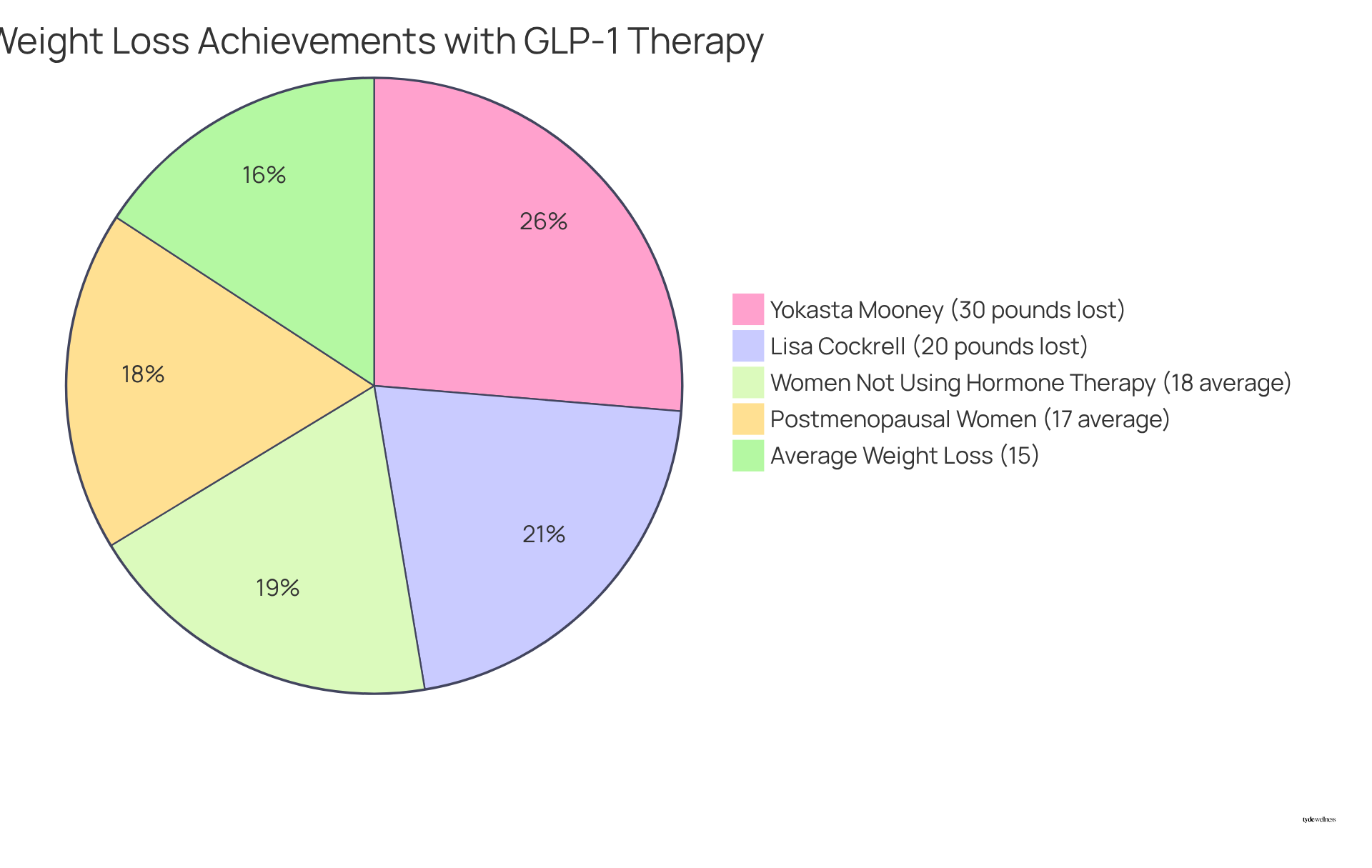
Ozempic: A Leading GLP-1 Medication for Weight Loss Success
Ozempic (semaglutide) is a notable GLP-1 receptor agonist recognized for its significant impact on body mass reduction. Clinical studies indicate that patients using Ozempic can achieve an average weight loss of approximately 15% over 68 weeks. This treatment mimics the GLP-1 hormone, which plays a crucial role in regulating appetite and food consumption. As a result, users experience reduced hunger and heightened feelings of fullness, making it particularly beneficial for individuals facing obesity and related challenges.
Dr. Mickey Seger, head of bariatric surgery, emphasizes the importance of medical supervision when using weight-reduction medications like Ozempic. He states, “Patients may experience significant reductions in size, but they could also be losing essential muscle mass if not carefully observed.” This highlights the necessity of a nutrient-dense diet to maintain muscle and overall well-being during weight loss.
The effectiveness of Ozempic has established it as the most effective weight loss medication in the evolving field of weight-loss treatments, increasingly recognized as a biological phenomenon. Prof. Naveed Sattar suggests that a deeper understanding of obesity may reduce the inclination to blame patients for their condition, indicating a shift in medical perspectives towards obesity treatment. This broader context underscores the importance of the most effective weight loss medication, such as Ozempic, in addressing obesity and its associated health issues.
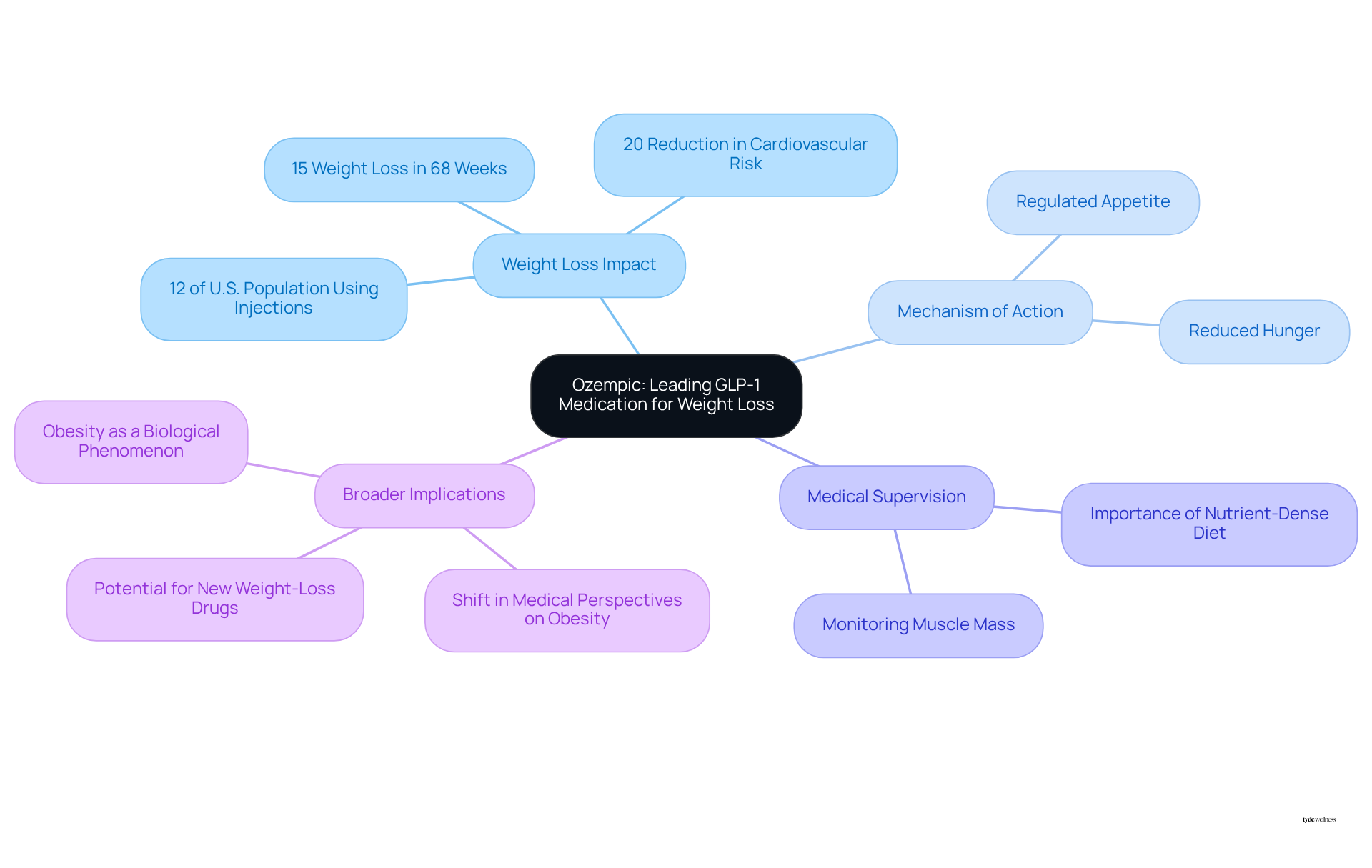
Wegovy: Targeted Weight Management with Proven Results
Wegovy, also known as semaglutide, is specifically approved as the most effective weight loss medication for the chronic management of body mass and has demonstrated remarkable results in clinical trials. Participants have achieved an average weight loss of 15% to 20% over a period of 68 weeks, which translates to approximately 18.5 pounds over six months. This medication operates similarly to Ozempic by enhancing the body’s natural GLP-1 levels, aiding in appetite control and reducing caloric intake.
Wegovy is particularly effective for individuals with a body mass index (BMI) of 30 or greater, or 27 with related weight-related medical conditions. Notably, 36% of participants using semaglutide reached significant wellness objectives, highlighting its potential as one of the most effective weight loss medications for body mass reduction. Furthermore, the recent FDA approval for cardiovascular risk reduction associated with Wegovy emphasizes its broader health benefits.
While Wegovy is effective, it is essential to consider potential side effects. Therefore, individuals should consult healthcare professionals before initiating treatment.
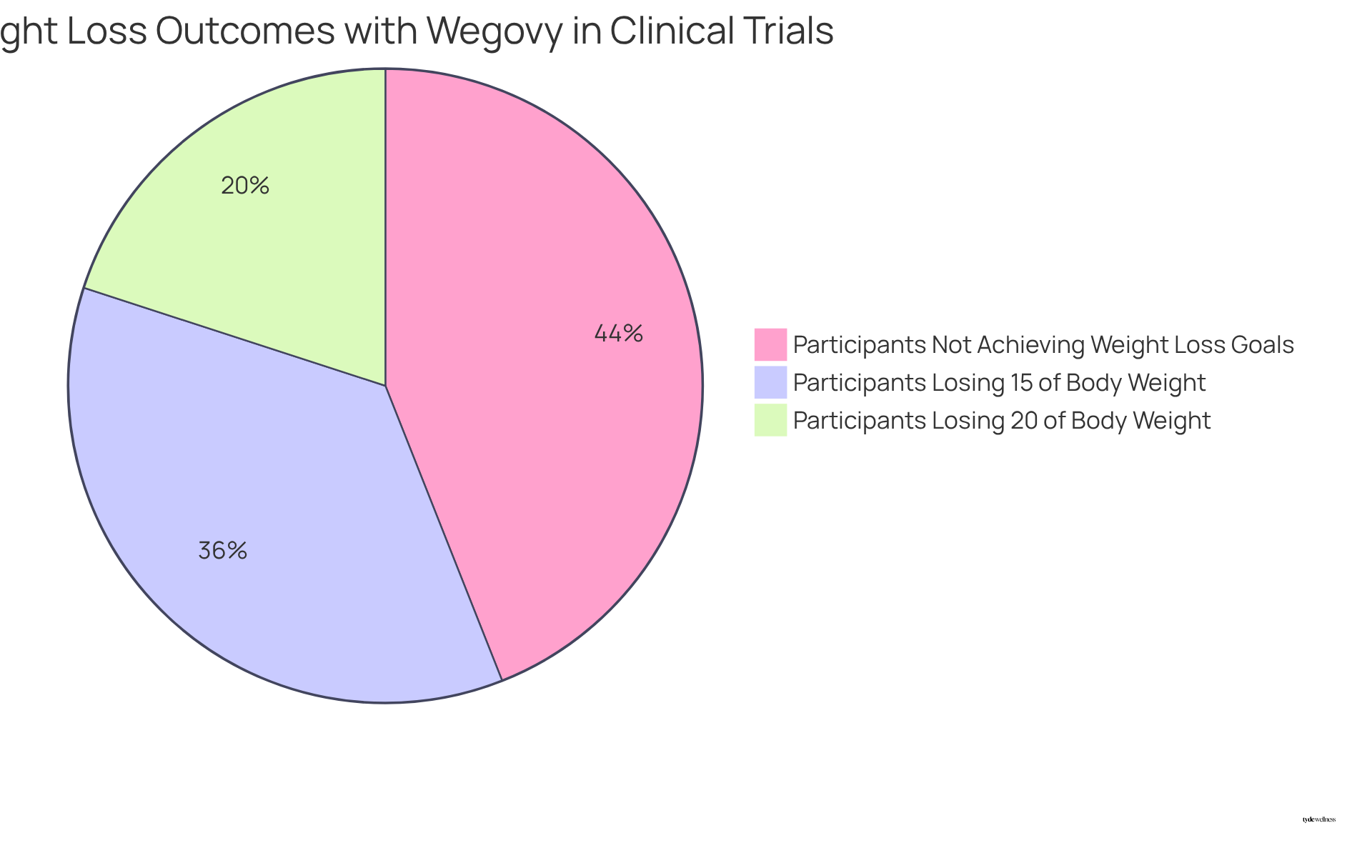
Saxenda: An Alternative GLP-1 Option for Effective Weight Loss
Saxenda (liraglutide) is a notable GLP-1 medication recognized for its effectiveness in reducing body mass. Administered via daily injections, it promotes an average weight reduction of 5% to 10% over the course of a year. However, it is essential to understand that Saxenda achieves comparable reductions in body mass in only 29% of obesity patients and 12% of type 2 diabetes patients, suggesting that its effectiveness can vary among individuals.
The mechanism by which Saxenda operates involves appetite suppression and increased feelings of fullness, which assists individuals in adhering to a reduced-calorie diet. This medication is particularly beneficial for those who may not reach their desired outcomes with other fat reduction therapies, as it is considered one of the most effective weight loss medications.
Recent studies conducted in 2025 have further confirmed its real-world effectiveness, underscoring Saxenda’s role as one of the most effective weight loss medications for sustainable body mass management. To fully leverage the benefits of Saxenda, it is crucial to adhere to the treatment schedule, as consistent use is linked to achieving significant reductions in mass.
Additionally, potential side effects, such as stomach upset and fatigue, should be discussed with a healthcare provider to ensure a comprehensive understanding of the treatment.
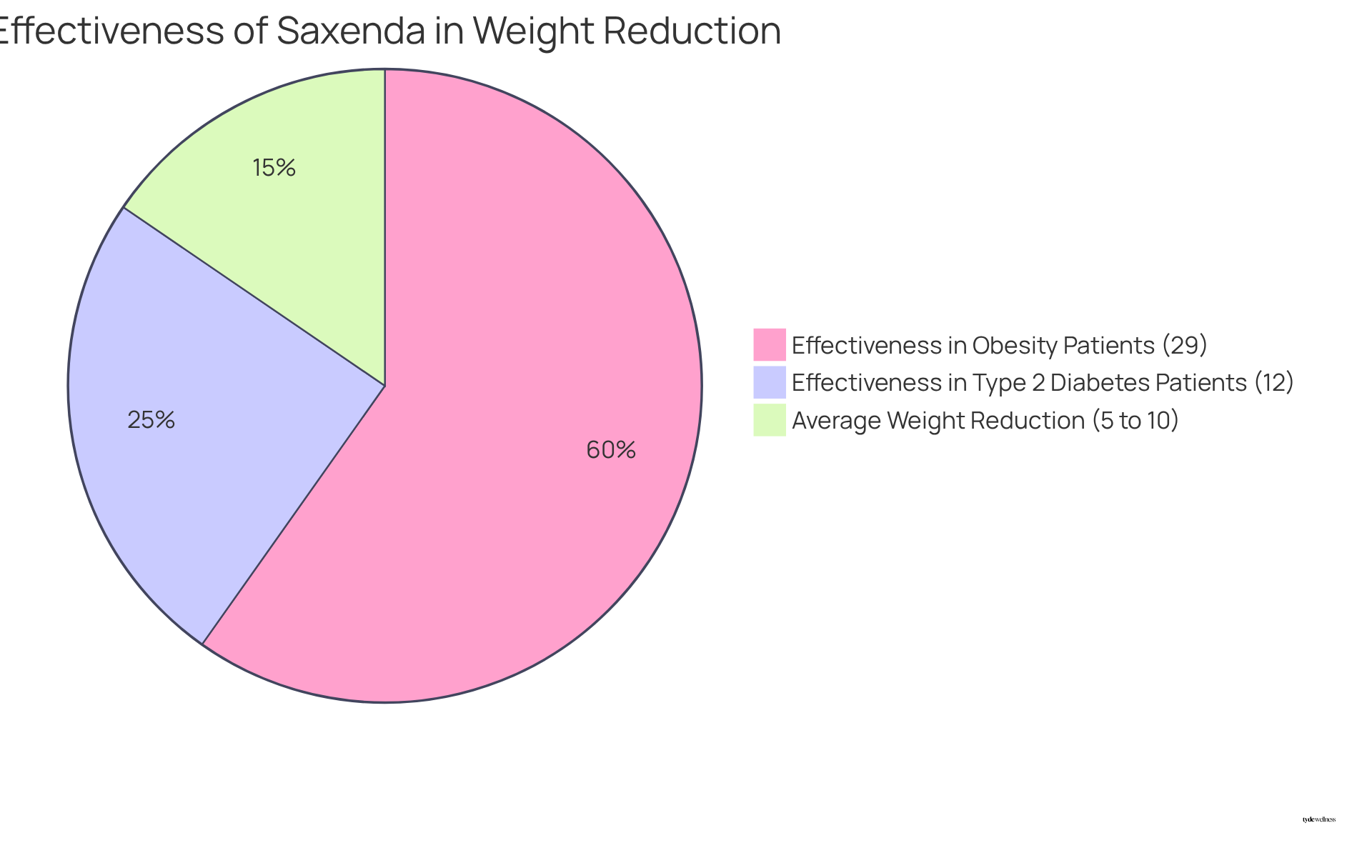
Tirzepatide: A New Contender in Weight Loss Medications
Tirzepatide, marketed under the brand name Zepbound, signifies a notable advancement in GLP-1 medications, showcasing impressive efficacy in clinical trials. By activating both GLP-1 and GIP receptors, tirzepatide facilitates a reduction in body mass through a dual mechanism of action. Clinical studies reveal that participants using tirzepatide can achieve an average reduction of approximately 20.2% over a 72-week period, with 32% of participants experiencing a body-mass decrease of at least 25%, compared to only 16% for those receiving semaglutide. This positions tirzepatide as the most effective weight loss medication available for body mass reduction.
Importantly, all individuals in the trial received guidance on diet and exercise, which is crucial for understanding the context of these weight loss outcomes. While the medication is especially beneficial for individuals facing obesity and metabolic syndrome, it is essential to acknowledge that side effects were reported; 44% of participants experienced nausea, and 25% reported abdominal pain. Expert insights, including those from Dr. Louis Aronne, underscore the complexity of managing body mass and the ongoing need for improvements in the most effective weight loss medication. This comprehensive approach positions tirzepatide as a promising solution for sustainable body management.
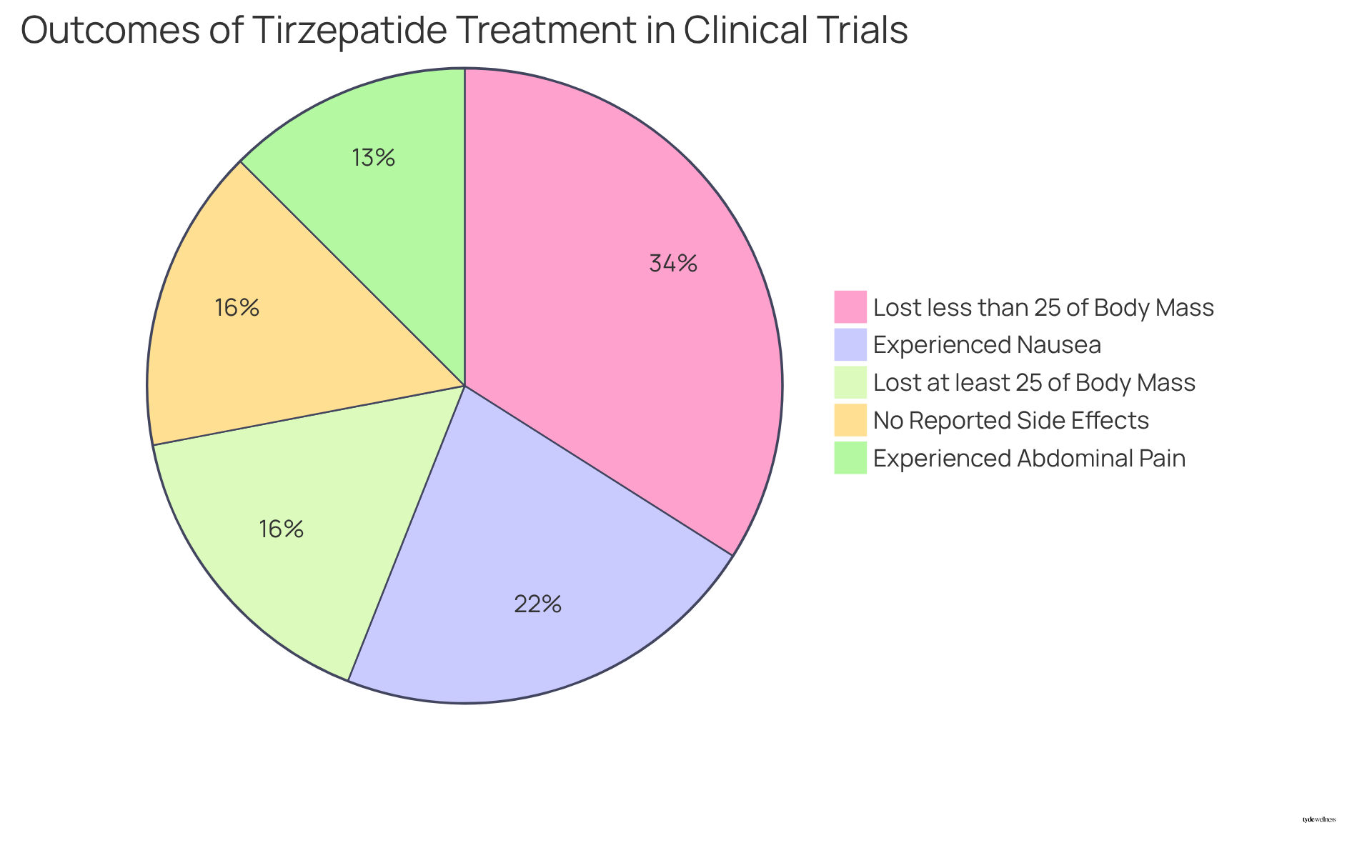
Contrave: A Combination Approach to Weight Loss
Contrave, recognized as one of the most effective weight loss medications, is a combination medication that pairs naltrexone with bupropion, specifically designed to reduce appetite and curb cravings. Clinical trials have demonstrated that:
- 42% of non-diabetic participants lost at least 5% of body mass with Contrave, compared to 17% with a placebo.
- 36% of diabetic participants achieved comparable weight loss results, in contrast to 18% with placebo.
When combined with lifestyle changes, the most effective weight loss medication can help participants achieve an average reduction of 5% to 10% over the course of a year.
The mechanism of Contrave involves influencing the brain’s reward system, enabling individuals to better manage their eating behaviors. This medication is particularly beneficial for those grappling with emotional eating or persistent cravings, and it is considered one of the most effective weight loss medications, offering a supportive alternative for sustainable management of body composition. However, it is crucial to note that Contrave carries a black-box warning due to the risk of suicidal thoughts associated with bupropion.
Potential side effects may include:
- Nausea
- Vomiting
- Constipation
- Headache
- Dizziness
- Insomnia
- Dry mouth
- Diarrhea
- Elevated blood pressure
- Increased heart rate
Users are advised to discontinue use if no significant reduction in body mass is observed after 12 weeks. For individuals considering Contrave, consulting with a healthcare provider to discuss personal health needs and potential risks is essential.
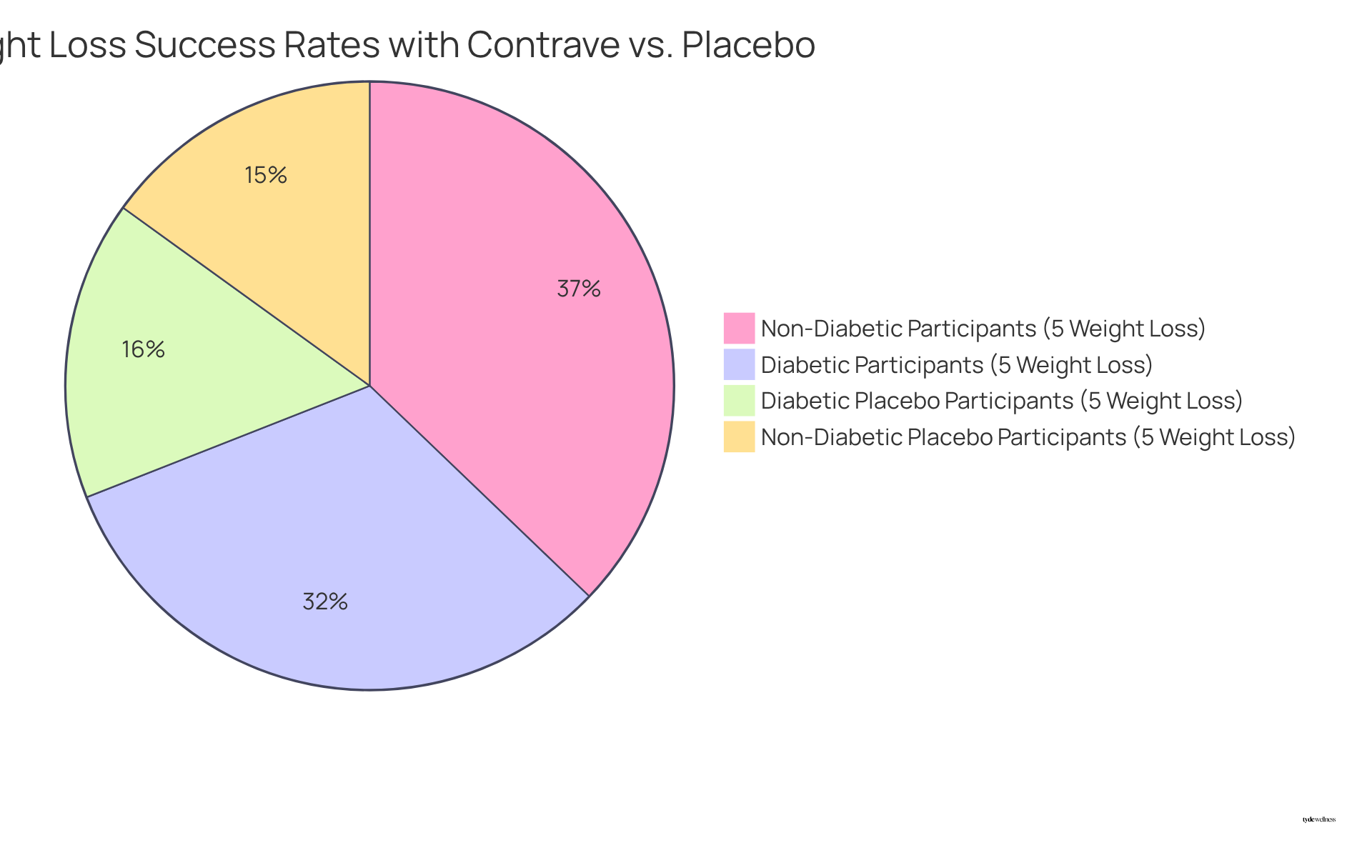
Orlistat: A Traditional Medication for Weight Management
Orlistat, marketed as Alli, is a well-established medication designed to assist in reducing body mass by inhibiting the absorption of dietary fats in the intestines. This mechanism allows users to potentially lose between 5% to 10% of their body mass over a six-month period when combined with a calorie-restricted diet. Clinical trials indicate that individuals using Orlistat can achieve an average weight loss of approximately 19 pounds compared to those relying solely on diet and exercise, significantly more than those taking a placebo. Furthermore, over 40% of individuals using Alli lose 5% or more of their body mass within a year, underscoring its effectiveness.
However, it is crucial to adhere to a low-fat diet while using this treatment to minimize gastrointestinal side effects, which may include:
- Oily stools
- Flatulence
- Increased bowel movements
These side effects can be more pronounced when Orlistat is taken with high-fat meals, although they typically diminish over time. Health experts emphasize that while Orlistat may be beneficial, it should be regarded as the most effective weight loss medication within a broader management plan rather than as a standalone solution. As Dr. Erica Phillips notes, “Even the most effective weight loss medication serves as a therapy, not prevention,” highlighting the importance of lifestyle modifications alongside treatments for sustainable weight reduction. Caroline Apovian further stresses, “It is about losing pounds the right way,” reinforcing the necessity for a holistic approach to managing body mass.
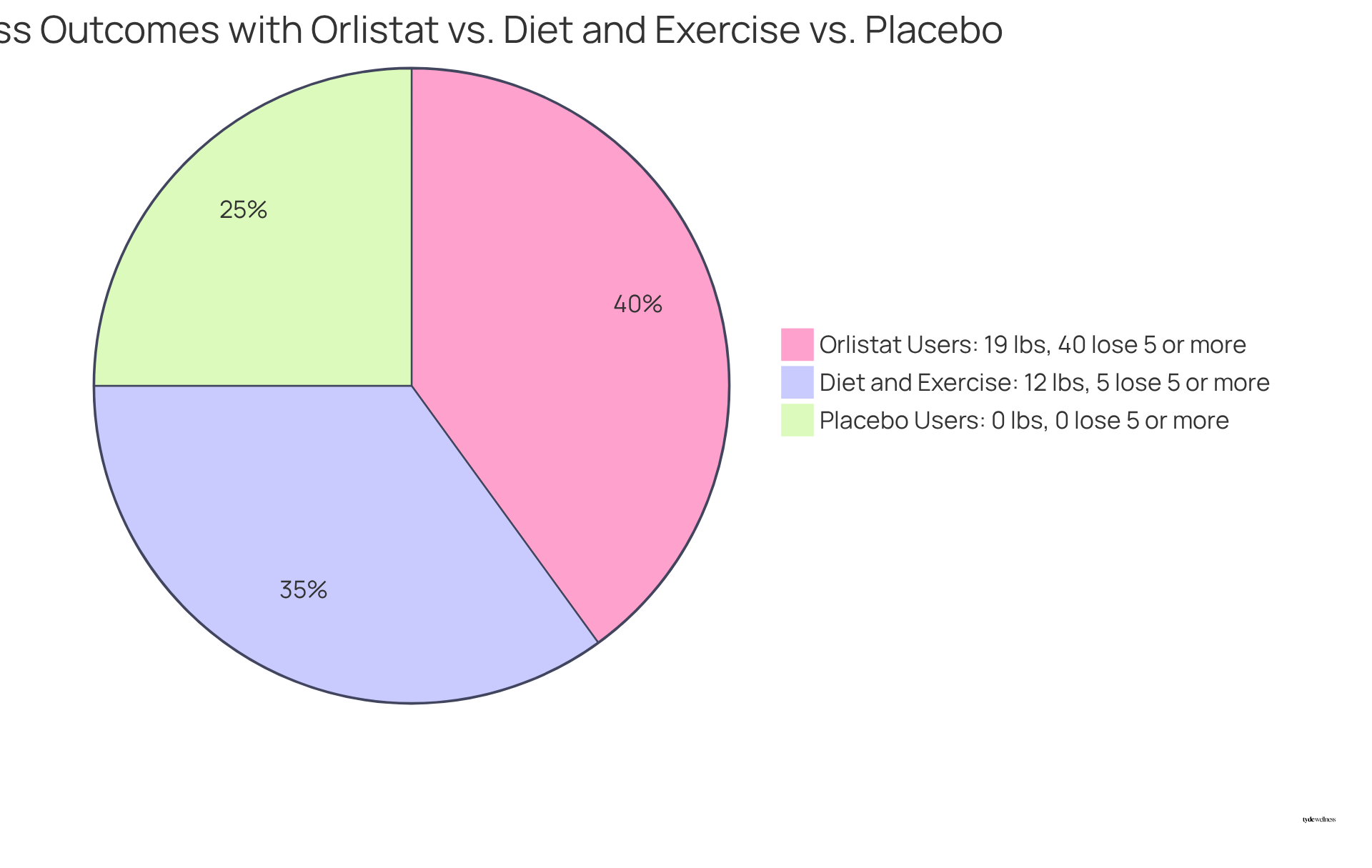
Phentermine: A Quick-Acting Weight Loss Solution
Phentermine is a commonly prescribed appetite suppressant designed for short-term fat loss. Typically, it results in an average reduction of approximately 5.9% after 24 weeks of treatment, translating to about 16 pounds (7.3 kg) for individuals using the medication. This drug operates by stimulating the central nervous system, effectively curbing hunger and enhancing energy levels. Clinical studies indicate that participants taking Phentermine lost an average of 5.9% of their initial mass over 24 weeks, significantly exceeding the 2.8% loss observed in those on a placebo.
Despite its effectiveness, Phentermine is generally prescribed for a limited duration due to potential side effects, including increased heart rate and insomnia. Healthcare professionals frequently recommend it as part of a more comprehensive approach to weight loss that incorporates lifestyle changes, such as diet and exercise. This combination is crucial, as research suggests that integrating Phentermine with behavioral interventions can enhance outcomes, particularly for individuals struggling to achieve significant results through lifestyle modifications alone. For instance, early intervention with Phentermine has been shown to more than double the mass reduction for patients who initially respond poorly to behavioral methods.
In summary, while Phentermine is considered one of the most effective weight loss medications for rapid weight loss, its optimal results are realized when combined with sustainable lifestyle changes. This makes it a valuable option for those looking to initiate their journey towards a healthier body. Furthermore, it is essential to note that the use of Phentermine has declined as newer medications, such as tirzepatide and semaglutide, have gained popularity in the market for weight reduction.
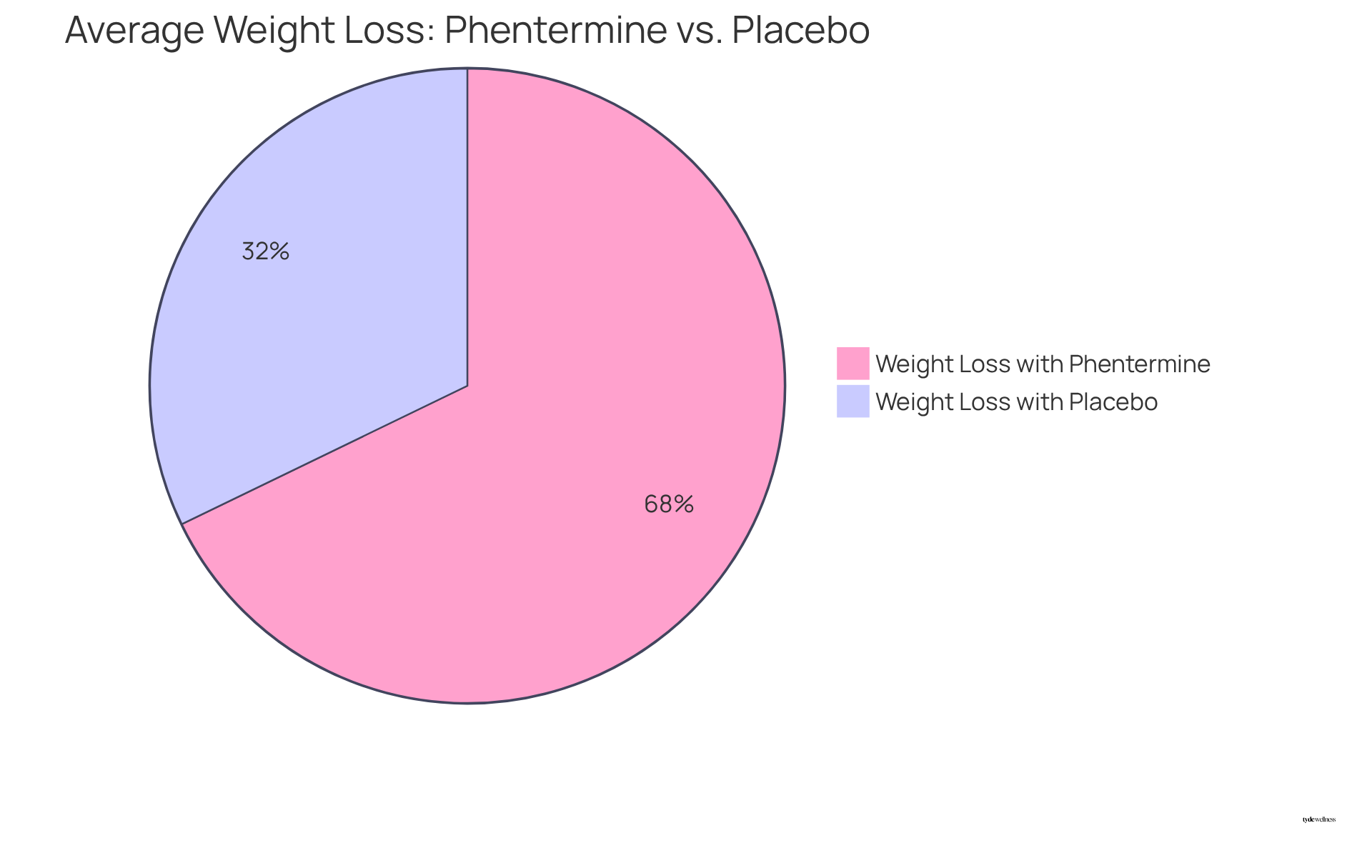
Bariatric Surgery: A Surgical Option for Severe Weight Loss
Bariatric surgery is a vital intervention for individuals facing severe obesity, typically defined by a BMI of 40 or higher. Among the most common procedures are gastric bypass and sleeve gastrectomy. Both surgeries can lead to substantial weight loss, often exceeding 30% of total body mass within the first year. These procedures work by limiting food intake and altering the digestive process, resulting in reduced calorie absorption. For instance, patients undergoing gastric bypass can expect an average weight reduction of 30% to 35% in the initial year. Sleeve gastrectomy is also favored for its effectiveness and straightforward approach.
However, the success of bariatric surgery goes beyond the surgical procedure itself. Commitment to lifestyle changes following surgery is essential for sustaining weight loss and enhancing overall health. As one expert stated, “Surgery is a tool, but it’s not a replacement for proper nutrition, exercise, and long-term commitment.” This emphasizes the necessity of ongoing support and adherence to a healthier lifestyle for achieving long-term success. Furthermore, bariatric surgery patients frequently enjoy significant health improvements, including remission of diabetes in 50% to 60% of cases, reflecting the broader benefits of these procedures.
As advancements continue in the field, innovations in surgical techniques and a collaborative approach are enhancing patient outcomes, establishing bariatric surgery as a viable option for those seeking lasting weight loss solutions. This collaborative approach involves a team of specialists dedicated to providing comprehensive care tailored to individual needs.
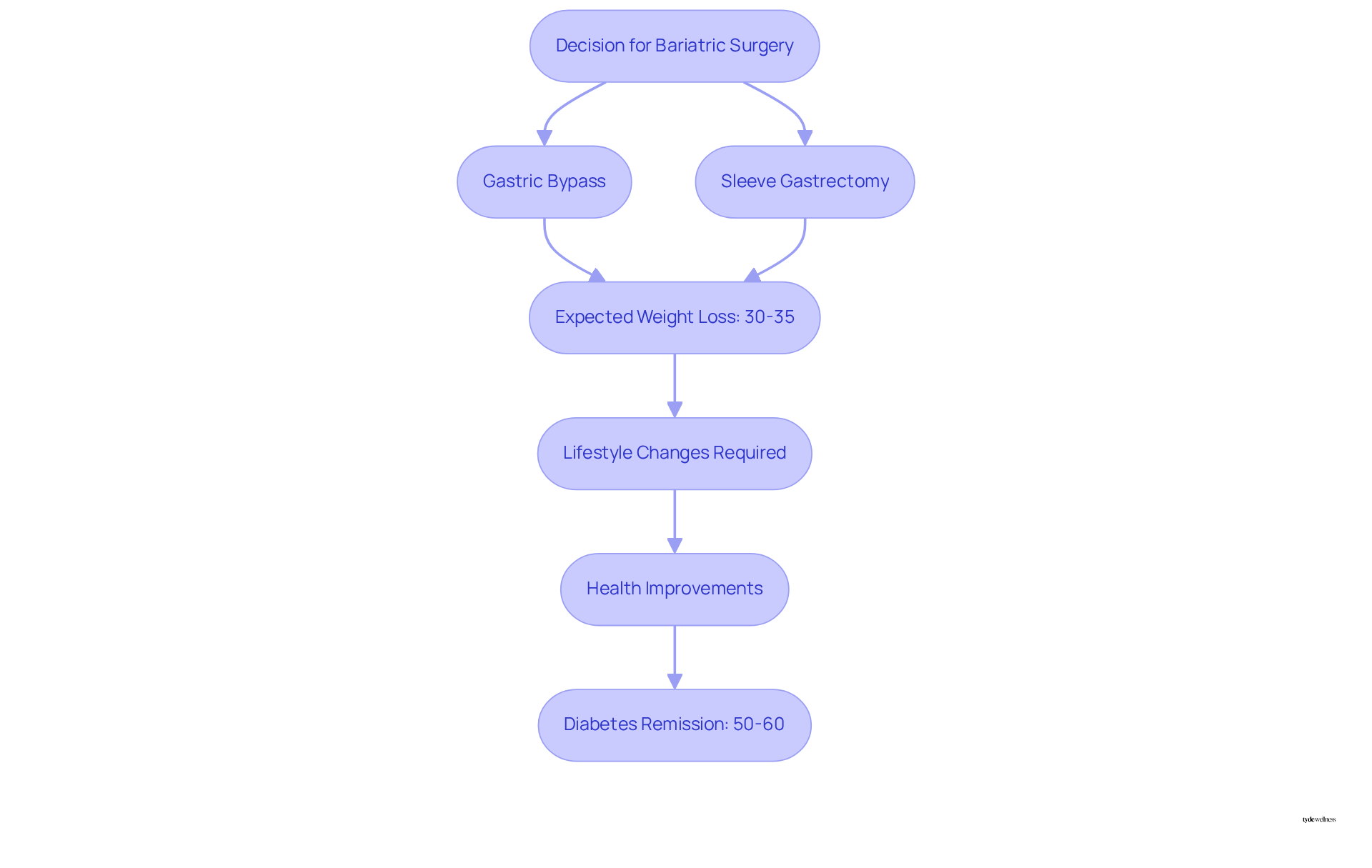
Side Effects of Weight Loss Medications: What Women Need to Know
Weight loss therapies, particularly GLP-1 drugs, can exhibit a range of side effects that women should thoughtfully evaluate before beginning treatment. Commonly reported side effects include:
- gastrointestinal issues such as nausea
- diarrhea
- constipation
- headaches
However, more severe risks, including acute pancreatitis and kidney complications, have been linked to these treatments. Research indicates that nearly one in 100 users of GLP-1 treatments may encounter pancreatitis, a condition that can lead to serious complications. The Medicines and Healthcare products Regulatory Agency (MHRA) has received close to 400 reports of acute pancreatitis from patients using Mounjaro, Wegovy, Ozempic, and liraglutide, highlighting the prevalence of this serious side effect. An analysis found 6,751 reports of acute pancreatitis associated with GLP-1 drugs between 2005 and 2023, underscoring the seriousness and frequency of these complications.
Considering the possibility of significant side effects, it is essential for women to engage in open conversations with healthcare professionals about their medical history and any concerns related to these medications. Dr. Ivania Rizo emphasizes the importance of monitoring well-being throughout the treatment process, as many patients may experience adverse reactions that require medical attention. Understanding these risks empowers women to make informed decisions about their weight loss journey, ensuring they choose the most effective weight loss medication that suits their health needs and lifestyle.
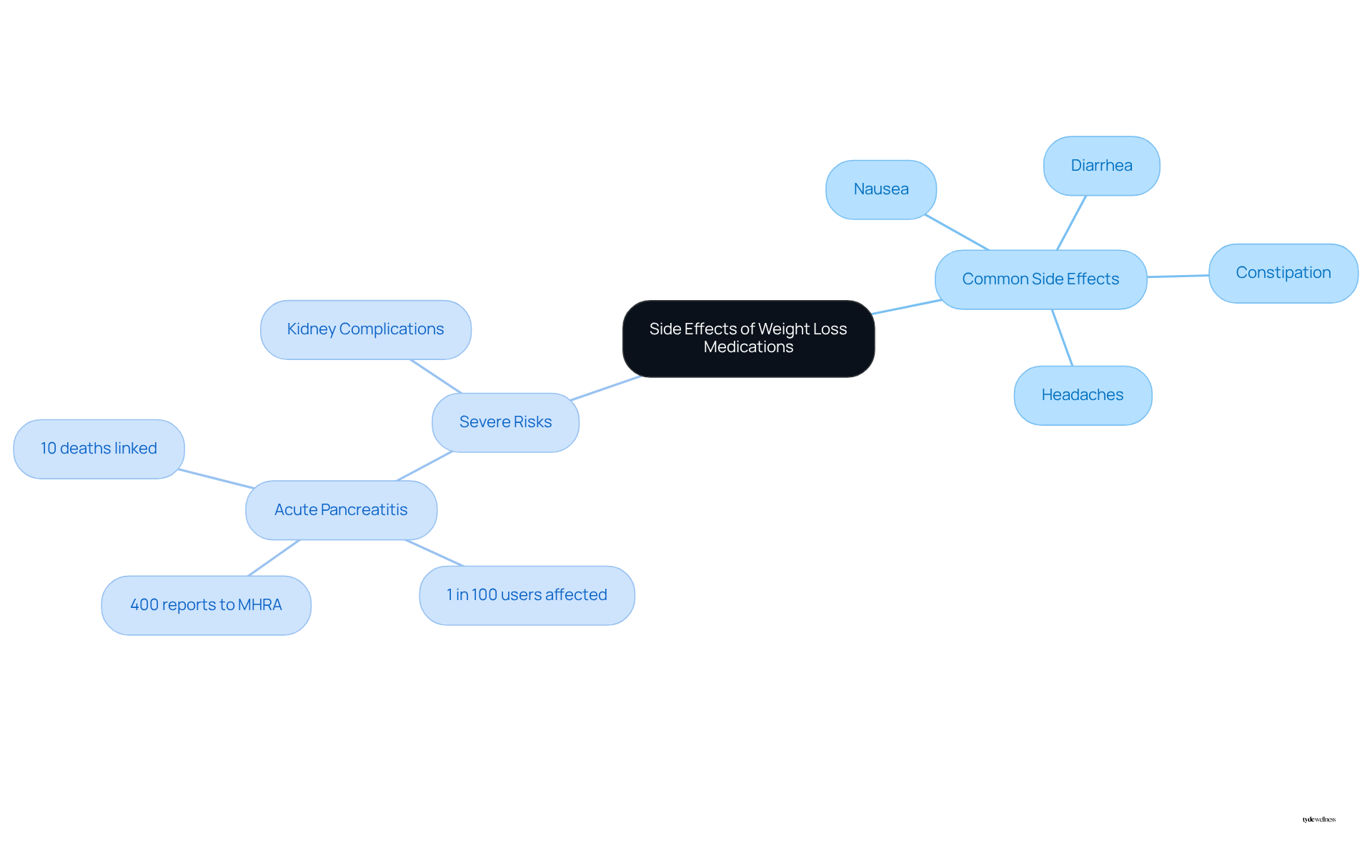
Conclusion
The exploration of weight loss medications for women reveals a range of effective options tailored to individual needs. Notably, GLP-1 therapies such as Ozempic and Wegovy have demonstrated impressive results in clinical trials. Additionally, alternative solutions like Saxenda and Contrave provide women with various treatments that can significantly aid in their weight loss journeys. Each medication features unique mechanisms of action, offering choices that align with women’s health goals and lifestyles.
Key insights from the article highlight the effectiveness of these medications, with many users experiencing substantial weight loss when these treatments are combined with lifestyle changes. The article emphasizes the importance of consulting healthcare professionals to navigate potential side effects and ensure a comprehensive approach to weight management. Furthermore, personalized programs, such as those offered by Tyde Wellness, underscore the value of tailored support in achieving sustainable weight loss.
In summary, the landscape of weight loss medications for women is evolving, presenting promising solutions that can lead to significant health improvements. As women consider their options, it is essential to engage in open discussions with healthcare providers, weigh the benefits and risks, and adopt a holistic approach that includes lifestyle changes. Empowering oneself with knowledge about these medications can pave the way for informed decisions and ultimately lead to successful and lasting weight management.
Frequently Asked Questions
What is Tyde Wellness and what services does it provide?
Tyde Wellness specializes in personalized GLP-1 therapy for women undergoing significant life changes, such as postpartum and menopause. They offer customized solutions that combine medical expertise, practical nutrition plans, and continuous support to promote sustainable weight loss.
What is GLP-1 therapy and how effective is it for weight loss?
GLP-1 therapy involves medications that mimic the GLP-1 hormone, which regulates appetite and food consumption. Studies show that women using GLP-1 treatments can achieve an average weight loss of 15% after 68 weeks, with some individuals losing 20-25% within a year.
Can you provide examples of weight loss success using GLP-1 medications?
Yes, for instance, Yokasta Mooney lost 30 pounds after starting Ozempic during menopause, which helped manage her menopause symptoms. Similarly, Lisa Cockrell reported a 20-pound reduction using Mounjaro, alleviating her menopause-related difficulties.
What challenges do women face when considering GLP-1 therapy?
Women often encounter barriers such as cost and stigma when seeking GLP-1 therapy. It is important for them to consult healthcare professionals about their options and to consider integrating the therapy with a balanced diet and regular exercise for optimal results.
What is Ozempic and how does it work for weight loss?
Ozempic (semaglutide) is a GLP-1 receptor agonist that helps reduce body mass by mimicking the GLP-1 hormone, which decreases hunger and increases feelings of fullness. Clinical studies indicate an average weight loss of about 15% over 68 weeks for users.
What precautions should be taken when using Ozempic?
Medical supervision is crucial when using Ozempic, as patients may lose not only fat but also essential muscle mass if not monitored properly. A nutrient-dense diet is recommended to maintain muscle and overall well-being during weight loss.
What is Wegovy and how does it compare to Ozempic?
Wegovy, also known as semaglutide, is specifically approved for chronic weight management and has shown an average weight loss of 15% to 20% over 68 weeks. It works similarly to Ozempic by enhancing natural GLP-1 levels to aid in appetite control and caloric intake reduction.
Who is Wegovy intended for and what are its health benefits?
Wegovy is effective for individuals with a body mass index (BMI) of 30 or greater, or 27 with related weight-related medical conditions. It has also received FDA approval for cardiovascular risk reduction, highlighting its broader health benefits.
Are there potential side effects associated with Wegovy?
Yes, while Wegovy is effective for weight management, it is essential for individuals to consult healthcare professionals about potential side effects before starting treatment.
List of Sources
- Tyde Wellness: Personalized GLP-1 Therapy for Sustainable Weight Loss
- New Year, new approach to weight loss: Almost three quarters of UK women are considering using GLP-1s in 2025 (https://news-medical.net/news/20250103/New-Year-new-approach-to-weight-loss-Almost-three-quarters-of-UK-women-are-considering-using-GLP-1s-in-2025.aspx)
- Hormone therapy supercharges tirzepatide, unleashing major weight loss after menopause (https://sciencedaily.com/releases/2025/07/250713031441.htm)
- Women turn to weight loss drugs in menopause: What to know about the benefits and risks (https://abcnews.go.com/GMA/Wellness/women-turn-weight-loss-drugs-menopause-benefits-risks/story?id=115067358)
- pharmko.com (https://pharmko.com/blog/weight-loss-statistics)
- Why Delilah’s GLP-1 Plans Dominate 2025 Weight Loss Trends (https://newswire.com/news/why-delilahs-glp-1-plans-dominate-2025-weight-loss-trends-22615011)
- Ozempic: A Leading GLP-1 Medication for Weight Loss Success
- The weight-loss drugs being tested in 2025: will they beat Ozempic? (https://nature.com/articles/d41586-025-00376-w)
- How weight-loss wonder drugs are redefining the way our bodies work (https://theguardian.com/news/ng-interactive/2025/may/17/weight-loss-drugs-altering-views-how-body-brain-work)
- Weight-loss injections surge as 15M Americans turn to Ozempic, Wegovy for quick results (https://news4sanantonio.com/news/local/weight-loss-injections-surge-as-15m-americans-turn-to-ozempic-wegovy-for-quick-results-san-antonio-doctors-patients-food-eating-ozempic-wegovy)
- Wegovy: Targeted Weight Management with Proven Results
- Weekly semaglutide improves blood sugar and weight in adults with Type 1 diabetes (https://news.ohsu.edu/2025/06/23/weekly-semaglutide-improves-blood-sugar-and-weight-in-adults-with-type-1-diabetes)
- Higher Dose of Wegovy Provided Average Weight Loss of 21% in People with Obesity With a Third Achieving 25% or More – Drugs.com MedNews (https://drugs.com/clinical_trials/higher-wegovy-provided-average-weight-loss-21-obesity-third-achieving-25-more-22079.html)
- Novo Nordisk’s experimental drug results in up to 24% weight loss (https://reuters.com/business/healthcare-pharmaceuticals/novo-nordisks-experimental-drug-results-up-24-weight-loss-2025-06-20)
- Monthly weight loss drug helps people lose 20% of body weight, trial finds (https://nbcnews.com/health/health-news/monthly-weight-loss-drug-helps-people-lose-20-body-weight-trial-finds-rcna214080)
- Saxenda: An Alternative GLP-1 Option for Effective Weight Loss
- Ozempic or Saxenda for Weight Loss: Which Works Best? (https://usnews.com/news/health-news/articles/2024-09-13/ozempic-or-saxenda-for-weight-loss-which-works-best)
- (https://safemedication.com/pharmacist-insights/2025/05/20/whats-the-buzz-on-liraglutide-semaglutide-and-tirzepatide)
- Weight loss drugs may cut cancer risk by 50% according to ‘transformational’ new study (https://nypost.com/2025/05/12/health/weight-loss-drugs-cut-cancer-risk-by-50-in-transformational-new-study)
- Tufts Experts Weigh in on New Generation of Weight Loss Medications | School of Medicine (https://medicine.tufts.edu/news-events/news/tufts-experts-weigh-new-generation-weight-loss-medications)
- Tirzepatide: A New Contender in Weight Loss Medications
- Head-to-Head Trial Compares Weight Loss Drugs (https://news.weill.cornell.edu/news/2025/05/head-to-head-trial-compares-weight-loss-drugs)
- Zepbound Bests Wegovy for Weight Loss in New Trial (https://usnews.com/news/health-news/articles/2024-12-04/zepbound-bests-wegovy-for-weight-loss-in-new-trial)
- Zepbound tops Wegovy for weight loss in first head-to-head study comparing the drugs (https://cbsnews.com/news/zepbound-wegovy-study-comparing-weight-loss-drugs)
- Tirzepatide Tops Semaglutide for Weight Loss: SURMOUNT-5 (https://tctmd.com/news/tirzepatide-tops-semaglutide-weight-loss-surmount-5)
- Zepbound (tirzepatide) showed superior weight loss over Wegovy (semaglutide) in complete SURMOUNT-5 results published in The New England Journal of Medicine | Eli Lilly and Company (https://investor.lilly.com/news-releases/news-release-details/zepbound-tirzepatide-showed-superior-weight-loss-over-wegovy)
- Contrave: A Combination Approach to Weight Loss
- Here are 8 FDA-approved medications for weight loss (https://newsnationnow.com/health/fda-approved-medications-for-weight-loss)
- FDA Approves New Weight Loss Treatment – Victor Valley News (https://vvng.com/fda-approves-new-weight-loss-treatment)
- FDA approves weight-loss drug Contrave – Harvard Health (https://health.harvard.edu/blog/fda-approves-weight-loss-drug-contrave-201409127431)
- Orlistat: A Traditional Medication for Weight Management
- Weight-loss drugs: Alli and Xenical (Orlistat) – Consumer Reports (https://consumerreports.org/cro/2012/04/weight-loss-drugs-alli-and-xenical-orlistat)
- FDA approves over-the-counter orlistat for weight loss (https://healio.com/news/endocrinology/20120325/fda-approves-over-the-counter-orlistat-for-weight-loss)
- The Latest on Medications for Weight Loss and Type 2 Diabetes | Patient Care (https://weillcornell.org/news/the-latest-on-medications-for-weight-loss-and-type-2-diabetes)
- Alli weight-loss pill: How does it work and are there risks? (https://mayoclinic.org/healthy-lifestyle/weight-loss/in-depth/alli/art-20047908)
- Health: Anti-obesity medications associated with weight rebound post-treatment (https://eurekalert.org/news-releases/1091742)
- Phentermine: A Quick-Acting Weight Loss Solution
- Starting anti-obesity medication early boosts weight loss | Penn Medicine (https://pennmedicine.org/news/early-anti-obesity-medications-boost-weight-loss)
- Long-Term Phentermine for Weight Loss Appears Safe, Effective (https://medscape.com/viewarticle/904926)
- Phentermine for Weight Loss: Benefits, Side Effects, and Dosage (https://healthline.com/nutrition/phentermine-weight-loss)
- GLP-1 Medications Overtake Traditional Weight-Loss Drugs (https://jamanetwork.com/journals/jama/fullarticle/2833993)
- Bariatric Surgery: A Surgical Option for Severe Weight Loss
- Health Rounds: Weight-loss surgery more effective than drugs in real world study (https://reuters.com/business/healthcare-pharmaceuticals/health-rounds-weight-loss-surgery-more-effective-than-drugs-real-world-study-2025-06-18)
- I’m a Bariatric Surgeon. Here’s How to Weigh GLP-1 or Surgery (https://ucsf.edu/news/2025/07/430361/im-bariatric-surgeon-heres-how-weigh-glp-1-or-surgery)
- NYU Langone Experts Present Latest Research on Weight Loss Surgery Outcomes & Techniques at 2025 ASMBS Annual Meeting (https://nyulangone.org/news/nyu-langone-experts-present-latest-research-weight-loss-surgery-outcomes-techniques-2025-asmbs-annual-meeting)
- State of the Union: Weight Loss Surgery in 2025 (https://columbiasurgery.org/news/state-union-weight-loss-surgery-2025)
- Head-to-head Study Shows Bariatric Surgery Superior to GLP-1 Drugs for Weight Loss (https://asmbs.org/news_releases/head-to-head-study-shows-bariatric-surgery-superior-to-glp-1-drugs-for-weight-loss)
- Side Effects of Weight Loss Medications: What Women Need to Know
- Potentially fatal side effect of weight-loss drugs sparks new investigation (https://nypost.com/2025/07/06/health/potentially-fatal-side-effect-of-weight-loss-drugs-sparks-new-investigation)
- Serious side-effects for popular weight loss drugs raising concerns (https://kutv.com/news/spotlight-on-america/serious-side-effects-for-popular-weight-loss-drugs-raising-concerns-risk-benefits-health-obesity-glp1-zepbound-wegovy-mounjaro-semiglutide-medication)
- GLP-1 Weight Loss Medications: Safety, Diet and Side Effects | PCOM (https://pcom.edu/south-georgia/news/safety-benefits-and-side-effects-of-glp-1-weight-loss-medications.html)
- Hundreds of weight loss and diabetes jab users report pancreas problems (https://theguardian.com/society/2025/jun/26/weight-loss-diabetes-jab-users-report-pancreas-problems)


